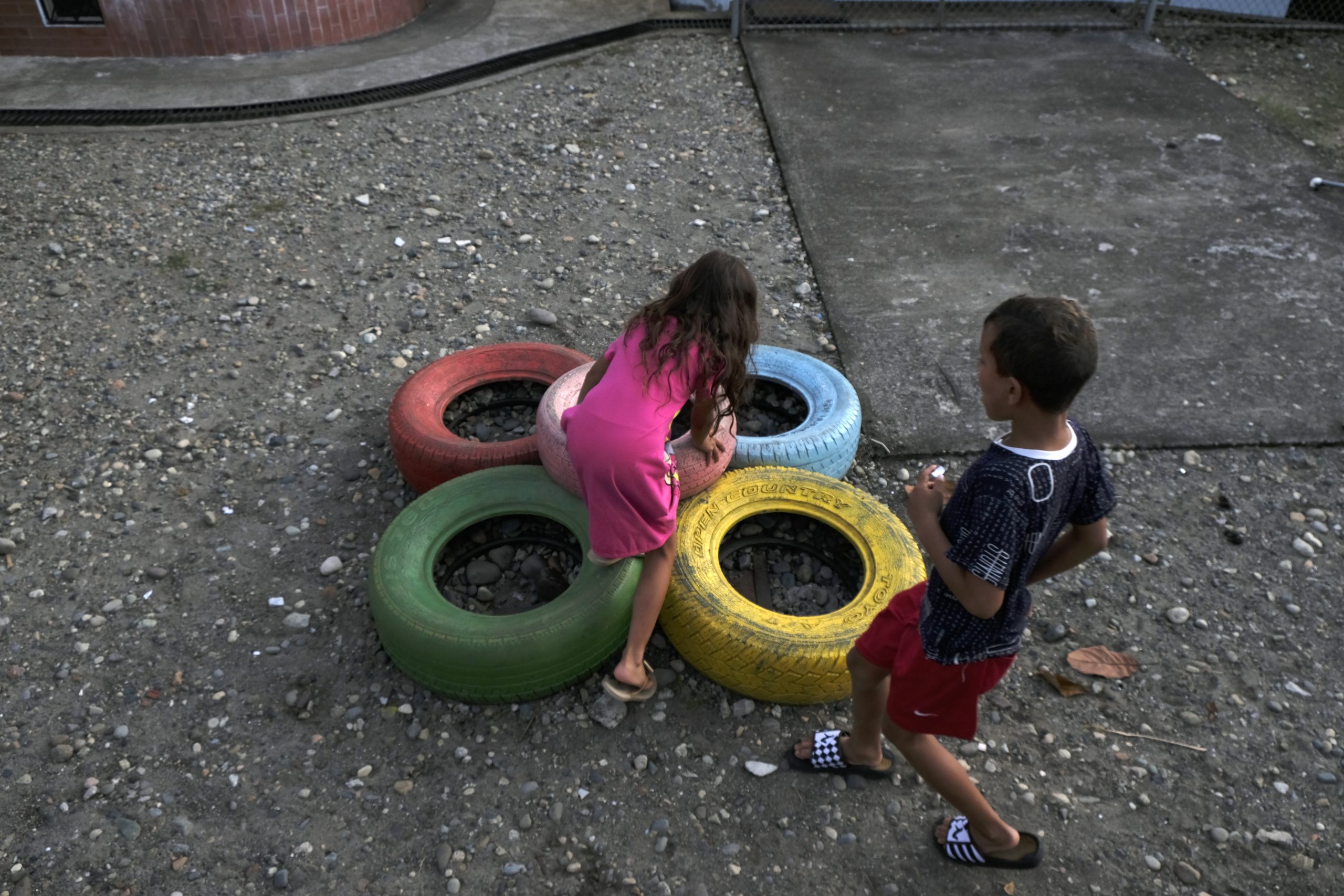
Two Venezuelan children play near the San Miguel International Bridge on the Ecuador-Colombia border. ©UNHCR/Santiago Escobar-Jaramillo
Snapshot
Entities sharing this good practice: Public Defender’s Office, UNHCR Ecuador
Submitted by: Dr. Angel Torres Machuca General Public Defender, Mgs. Rosy Jiménez. National Coordinator for Public Defence Management, Mgs. Pedro Velasco. National Focal Point for Human Mobility, Juan Guillermo Rivadeneira. Senior Protection Associate UNHCR.
Key stakeholders: UNHCR Ecuador
Visit their website: https://www.defensoria.gob.ec/?page_id=11072
In accordance with the 2008 Constitution of the Republic, the Public Defender’s Office of Ecuador (PDO) is an independent body of the judiciary whose purpose is to guarantee full and equal access to justice for people who, due to their economic, social or cultural situation, cannot hire legal representation to protect their rights. Within this framework, the Public Defender’s Office provides free legal advice and legal representation on human mobility to migrants, asylum-seekers, refugees and stateless persons.
The services provided by the PDO on human mobility includes the submission of asylum or statelessness applications, legal assistance during the interview and representation to appeal negative decisions. Additionally, the PDO advises and provides legal representation on cases related to inadmissibility to the territory, regularization of status, deportation and challenges to immigration administrative sanctions.
The work of the PDO related to people in human mobility began in 2008. However, it was not until 2012 when the PDO, supported in part by advocacy from UNHCR, began to focus more specifically on ensuring free legal support in administrative proceedings, such as asylum, which, in turn impacted the scope of the its work. From the Organic Law on Human Mobility, in 2017, the PDO issued a series of Resolutions relating to legal advice and representation of asylum-seekers, refugees and stateless persons, including Resolution 032/2017, which regulates the legal services in the context of asylum and provides that certain legal services should be made available including:
- advice prior to the beginning of the process,
- accompaniment or representation in the interview
- filing of appeals.
The Resolution contains a focus on age and gender diversity and establishes which individuals will be prioritized for these services including unaccompanied or separated children and adolescents.
At the same time, the PDO also works on strategic litigation on issues such as access to asylum procedures; ensuring reasoned decisions; the principle of equality and non-discrimination; and legal certainty.
By virtue of successive agreements between the PDO and UNHCR, the latter currently supports the work of the PDO with 10 consultants in the border areas, providing training and guidance on technical aspects. The agreements focus on a number of workstreams, including specialization of public defenders and training, strengthening of strategic litigation, guaranteeing the principle of non-refoulement (in cases of inadmissibility to the territory) and working with legal clinics.
- Legal advice and representation for all those who so wish within the framework of the refugee or stateless person status determination procedure, at all stages of the procedure.
- Assistance for carrying out immigration procedures.
- Legal representation of unaccompanied or separated children and adolescents from their families within the framework of the asylum procedure.
- Work on strengthening the free legal clinics of the universities.
- Strategic litigation.
During 2020 the PDO provided legal services relating to human mobility to 8,859 individuals in 10 provinces. Of these 8859 individuals supported, 5138 were female, 3619 were male.
Of the 8859 individuals supported, 5939 were supported in relation to the RSD process, of which 306 are unaccompanied or separated children or adolescents and 2448 are cases related to immigration regularization.
During 2020, 2,935 public officials were trained, including public defenders and lawyers from the Legal Clinics. As well as talks and workshops were given to 1169 PDO. This includes outreach to the host community.
As a result of the pandemic, the PDO had to set up electronic channels to continue communication with the population. While at first the authorities suspended the deadlines for the procedures, later these were resumed and the advisory service could continue.
The main element that helped the implementation of the good practice was the strong commitment of the authorities. In turn, UNHCR’s technical support was and continues to be decisive in the areas of guidance and training. However, the lack of human resources has been a significant challenge in the implementation of the practice. Although the PDO has hundreds of officials throughout the country, they attend to numerous matters, beyond matters related to human mobility. As observed, the PDO has also allowed better access to legal services for the asylum-seeking and refugee populations than other institutions that provide legal services, as it has greater capacity for coverage. It has had a substantial impact on raising the standards of the refugee status determination procedure as a consequence of both the legal defense of individual cases and strategic litigation.

Recent Comments